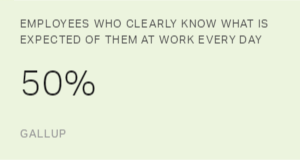This is the second article in a two-part series.
As more of the world moves toward knowledge-based economies in which companies automate many routinized jobs, competitive advantage increasingly depends on the effectiveness with which businesses develop and deploy their human capital -- that is, their employees' knowledge, skills and talents. However, the vast majority of organizations are not well-calibrated to meet this all-important need, contributing to the bleak finding from Gallup's new State of the Global Workplace report that just 15% of employees worldwide are engaged in their jobs. Conversely, 85% are functioning below their potential -- in terms of both their value to employers and the sense of fulfillment they derive from their work.
To some extent, the importance of human capital means an organization's success is attributable to abilities of its individual players -- thus, a great deal of dialogue on human capital focuses on the international competition for talent. More routinely, though, effective mobilization of human capital comes from the customs, values and routines that help the organization elicit higher levels of performance from all its employees, both on an individual and a collective basis. One of the most important ways thriving organizational cultures achieve this is by emphasizing continual development and growth.
Personal development came into greater focus as an essential human motivator in the 1950s with the popularization of Abraham Maslow's hierarchy of needs theory. Its importance as one of the highest-order workplace needs is reflected in Gallup's Q12 employee engagement metric, the final item of which is employees' agreement that "This last year, I have had opportunities at work to learn and grow." Workplace cultures that promote high engagement provide opportunities for personal fulfillment. Employees give more of themselves when they experience a sense of progress than when they feel stagnant.
What's more, research by Gallup and others has demonstrated that job-related educational opportunities can help bond employees to their organizations, increasing productivity that results from their new knowledge. As a recent study published in the Journal of Organizational Behavior concludes, "The learning climate provides employees with opportunities for dialogue, feedback and connection to the organization's vision, helping them develop a deeper connection between their jobs and the organizational goals."
Specialization Allows More Employees to Be the Best in Their Role
Because many organizations are automating roles, a higher proportion of the remaining jobs involve specialized knowledge and skills. That means employees have greater potential to increase their value by acquiring education and experiences that make them more effective in their particular niche in their organization. They are more likely than workers in times past to have the opportunity to be better in their specific role than anyone else in their company -- perhaps even the world.
It's no wonder, then, that their jobs are an integral part of so many employees' identity in the 21st century. Great managers recognize this and understand that it requires them to establish more personalized relationships with their team members than traditional management theory may call for. Particularly for millennials, who have lived most of their lives amid rapid technological changes that facilitate information sharing and innovation, the need for a development mentality is intuitive. They are more likely than older employees to prioritize learning and growth opportunities when seeking out new jobs or deciding to stay with current ones.
Outdated Workplace Cultures Must Change to Maximize Development
For many organizations, establishing a growth-oriented culture means discarding established performance management systems in favor of those that better support performance development. It requires a shift in mentality by the entire organization, starting with top executives, that transforms all HR and people-management functions, including hiring, training and development, and employee motivation as well as well-being initiatives.
The role of manager is also different in an organization oriented toward ongoing development of human capital. The shift requires not only regular communication between managers and their team members but also a different type of communication. It means establishing coaching relationships that allow managers to both understand and address requirements employees need to perform the jobs they were hired for and the higher-order needs required to create their ideal job and maximize their value to the organization.
Though the purpose of management has changed, workplace cultures worldwide have often been slower to adapt. This contributes to Gallup's dismal finding that 15% of employees worldwide are engaged at work. Two relics of outdated management, still prevalent in many workplaces, illustrate this point:
- Annual performance reviews reflect a cultural expectation that developmental conversations between managers and team members will be infrequent and highly structured and, therefore, probably too impersonal to be effective. Development-focused organizational cultures regard managers as coaches, which leads to a different set of expectations -- that such conversations will be frequent, focused on the employee as an individual and oriented toward the future.
- Another idea whose time has come and gone is tasking employees with managing others based on seniority alone and with little regard for their innate ability to relate to employees as individuals and inspire them to achieve higher levels of performance.
Few leaders in modern, knowledge-based organizations would argue with the idea that we are long past the era in which relationships between workers and management can be thought of as a zero-sum game. The role of management is no longer to defend the organization's best interests against the conflicting interests of employees but to look for ways to align employees' interests with those of the organization. That means working harder to understand what intrinsically motivates each employee to extract vast untapped reserves of human potential.
Learn more about how Gallup can help your organization shift to a culture of performance development:
- Register for the upcoming State of the Global Workplace webinar to hear from our experts who will provide additional insights into the link between productivity and employee centricity.
- Register your managers for an upcoming Leading High-Performance Teams course to give them the tools and techniques they need to inspire greater performance.
- Inquire about our performance management solutions, ranging from process redesign to manager training, designed to further your growth and development strategy.



